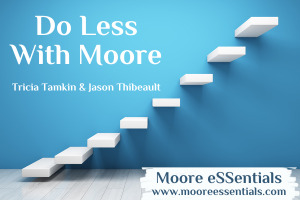Setting expectations is one of the basic fundamentals of managing any relationship, yet many of us fail to execute this properly. Setting expectations up front with candidates, hiring managers and our own team can help bring more success to us as recruiters. But it first requires planning and strong communication skills. People need to clearly see your vision and to get clients and candidates on the same page, you must communicate your expectations clearly, in a way they can be heard. Sometimes multiple times to make sure they are understood and accepted.
Setting expectations for projects and performance is also about setting clear boundaries. Your direction might come from your boss, your customers, your own vision for the future, or even from the collective goals of your team. However it comes about, it needs to be clearly articulated and spoken about often. It ensures you are all on the same page in terms of what needs to be accomplished. Setting clear boundaries requires defining what is within the scope of work and what is not, what appropriate behavior is and what is not, and what productive work is and what is not. When people have guidelines within which to operate, they are actually more empowered to act, take initiative, and innovate. To set expectations, it is best to involve the other party. A conversation that includes two-way feedback is one of the best ways to ensure continued improvement and better performance outcomes. Additionally, an honest conversation where you seek and accept feedback without defensiveness or excuses builds trust and your relationship with your team.
There are two sides of expectations — what we expect from others and what we expect from ourselves. And how we manage those expectations is critical to how we view our experiences and pursue our goals. Another important factor in managing expectations is knowledge. Whenever possible, do research and write down what you hear and refer back to it, because in many situations, we only listen selectively. With on-going written feedback, managing expectations becomes easier for both sides.
When we don’t hit our expectations, our brain often sends out a message of danger or threat. Some studies suggest that the cliché “hope for the best but expect the worst” has a lot of truth. But not always. The takeaway message, is to be adaptive. Understanding what is in your control and what is not is crucial in managing expectations and success. As a recruiter, you may know it is tough to find a certain types of talent for your clients and the process can sometimes feel impossible. You can have unreasonable expectations at two extremes: an expectation of finding a star candidate quickly or an assumption that you will never find the person for the job order no matter how hard you work. The better way to work with expectations is to do what you can to produce the best outcome and adjust expectations as you go along. For example, ask for a retainer up front so your time is covered financially and then give the project a set period of time before deciding how to move forward or if you need another financial investment from the client.
There are some people who believe we should set low expectations for ourselves and others to be pleasantly surprized and others who claim setting high expectations is best to help with personal growth. There is no template for managing expectations. It seems as if it is best to have low expectations of things out of our control, realistic expectations of things we can control to some degree and high expectations of ourselves. The key is having flexibility in our expectations and being willing to change track without self-blame that has been shown to increase well-being.
The lack of clearly understood expectation is the source of much conflict in relationships, the cause of most conflicts, and the beginning of poor organizational performance. As leaders, we must strive to build clear expectations throughout our organizations, and it must start with us. Below are 8 truths and tips to help set clear expectations for yourself, your clients, candidates and your team for more success:
Be clear as to what your desired outcomes are for all involved. It is pretty difficult to build mutually clear expectations with others if you don’t know exactly what they are yourself. If you can’t clearly articulate them verbally or on paper, you aren’t ready for this conversation yet.
Know where you need expectations. Think about where there is uncertainty, vague boundaries, unclear performance expectations or deliverables and target them first. Create a checklist – do you have expectations in each of key area for your recruitment practice, and are they clear to you?
Understand why. Having clear expectations is good, giving others the vision and value proposition will make them clearer and easier to follow. This is about justification to others. It is about helping people understand the bigger picture and commit more easily.
Meet and discuss. Once you have the first three steps completed, sit down with the other person to discuss your expectations.
Make it mutual. As a leader you have expectations of others that they need to know (and not have to guess) so they can succeed. They have expectations of you that you need to know as well. The conversation about expectations needs to be a true conversation – so that both of you understand each other’s expectations and so that you can more towards agreement.
Write them down. We aren’t talking a legal document here, but we all know that things written down allow for greater clarity, and without things being written down we must rely on memory. If you want clearly defined, mutually understood expectations, they must be written down.
Get agreement and commitment. Once you have them written, both parties need to read them to make sure they are understood and agreed to. Then both parties must commit to each other that they agree with them, and will live with them in the future.
And, perhaps the most important thing about expectations is that we should always expect the unexpected.
“Let us be about setting high standards for life, love, creativity, and wisdom. If our expectations in these areas are low, we are not likely to experience wellness. Setting high standards makes every day and every decade worth looking forward to.”
“The greater danger for most of us lies not in setting our aim too high and falling short; but in setting our aim too low, and achieving our mark.”





